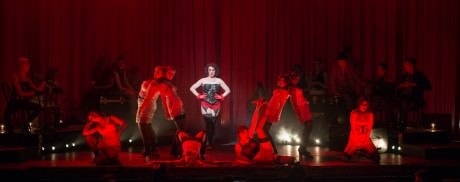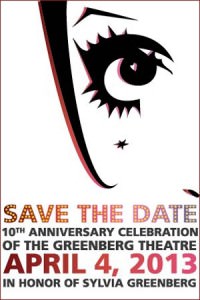“Willkommen, bienvenue, welcome!” the master of ceremonies begins, with an eerie grin. But you never really feel welcome, or at home. Nor would you want to. In American University’s production of the musical Cabaret, you are forced into the underbelly of 1930s Berlin. From the get-go, you know that there is something sinister growing here, and no matter how much the master of ceremonies, or Emcee (Shannon McArdle), insists that you forget your troubles, you will never feel at ease.
Cabaret draws from Christopher Isherwood’s 1939 novel Goodbye to Berlin and John Van Druten’s play I Am a Camera, both of which grapple with the rise of the Nazi party. Music and lyrics by John Kander and Fred Ebb reflect the darkest edge of the pairing’s works, a darkness that American University’s production ruminates on throughout.

Premiering on Broadway in 1966, Cabaret follows Clifford Bradshaw (Grant Saunders), an aspiring American novelist searching for inspiration in Berlin. He finds what he is looking for and more in Sally Bowles (Hayley Travers), a British cabaret performer with a restless soul. Though Sally prefers parties to politics, the world around them comes to a boil with Nazism’s burning presence.
American University performs Studio 54’s 1998 version of the musical. They chose this show, in part, to commemorate the tenth anniversary of its Harold and Sylvia Greenberg Theatre. Cabaret was the first musical produced in the Greenberg Theatre a decade ago.
Throughout the show, we are placed, trapped, inside the seedy Kit Kat Klub. Director Gail Humphries Mardirosian takes a head-on approach to the tragic underpinnings of the musical. Even in the opening scene, the actors’ manic laughter and contorted movements indicate that this world is frightening, not fun. (Note: many of the scenes are likely too scary for children.) Ana Cetina’s sound design expands on this direct approach in that the music and effects are loud and imposing. Cetina also splices sound clips of Nazi rhetoric in between scenes, a chilling decision that’s hard to ignore. The actors are, literally, in your face. They disperse into the crowd, even during the intermission. This serves the broader purpose of the show. We see the characters’ apathy towards Nazism, their implicit acceptance of the movement. By surrounding us in this cabaret of sex and passivity, Mardirosian argues that we are all a part of this immorality, and we should instead take active responsibility for our neighbors.
A lighthearted and relaxing musical this is not. What’s refreshing is that the show never pretends to be escapist entertainment; in fact, it parodies escapism because the message and the horror of the show are so apparent. American University’s Cabaret is supposed to be disturbing, and it achieves this end with stunning clarity in the musical’s final moments. (Seriously, stick around for the end.) Nazism’s evils are visible from the moment you see Scenic Designer Meghan Raham’s red backdrop with black furniture accents, the colors of the Nazi symbol. Instead of Nazism spreading its slow, insidious disease, you see its presence constantly, to the show’s ultimate detriment.
McArdle’s Emcee presents more of a specter than a character. You learn nothing of his motivations or true emotions; you only follow him as he guides you along his twisted path. In every scene, McArdle lurks in the corner of the stage. At times, he watches the action, smirking knowingly. At others, he watches the audience. He invites us to judge the characters for their flaws but does not let us forget that he is judging us. With this remarkable direction choice, McArdle becomes a dominant force in the show without overpowering important moments.
In Saunders, we find a bland leading man. He presents a character that, like a puppet, is acted upon rather than being an active participant in his own life. While the effect of this can be disengaging, it underscores that Cliff never takes a stand against the horrors around him. Like many before and during World War II, his placidity nourishes the Nazi’s strength.
Travers’ Sally, as with other characters in the show, is totally immersed in delusion, including her stubborn ignorance of emerging politics. But does she believe her own distortions of reality? Travers performs a sultry, soft rendition of “Maybe This Time” that urges us to dream with her. And Travers is so charming and vivacious that we want to have hope for her. Yet, as she shows Sally’s mounting desperation, we learn that our optimism should be tenuous at best.
Within a production with such discomforting themes, there are some heartwarming moments, most of which bloom in the relationship between Fraulein Schneider (Lexie Martin) and Herr Schultz (Paul Lysek, Jr.). Schneider, the proprietor of the apartment house where Cliff and Sally live, falls in love with Schultz, a sensitive fruit salesman. Their connection feels more genuine than the one between Travers and Saunders, in its gentle sweetness. You cling to these fleeting moments joy for the couple. Particularly endearing are their duets “It Couldn’t Please Me More” and “Married” because Martin and Lysek present a shy, awkward romance that contrasts Travers’ and Saunders’ torrid affair.

Running time: 3 hours, with a 15-minute intermission.
Cabaret has two more performance today at 2 PM and 8 PM at the Harold and Sylvia Greenberg Theatre — 4200 Wisconsin Ave NW, in Washington, DC. Tickets can be purchased at the door or online.




